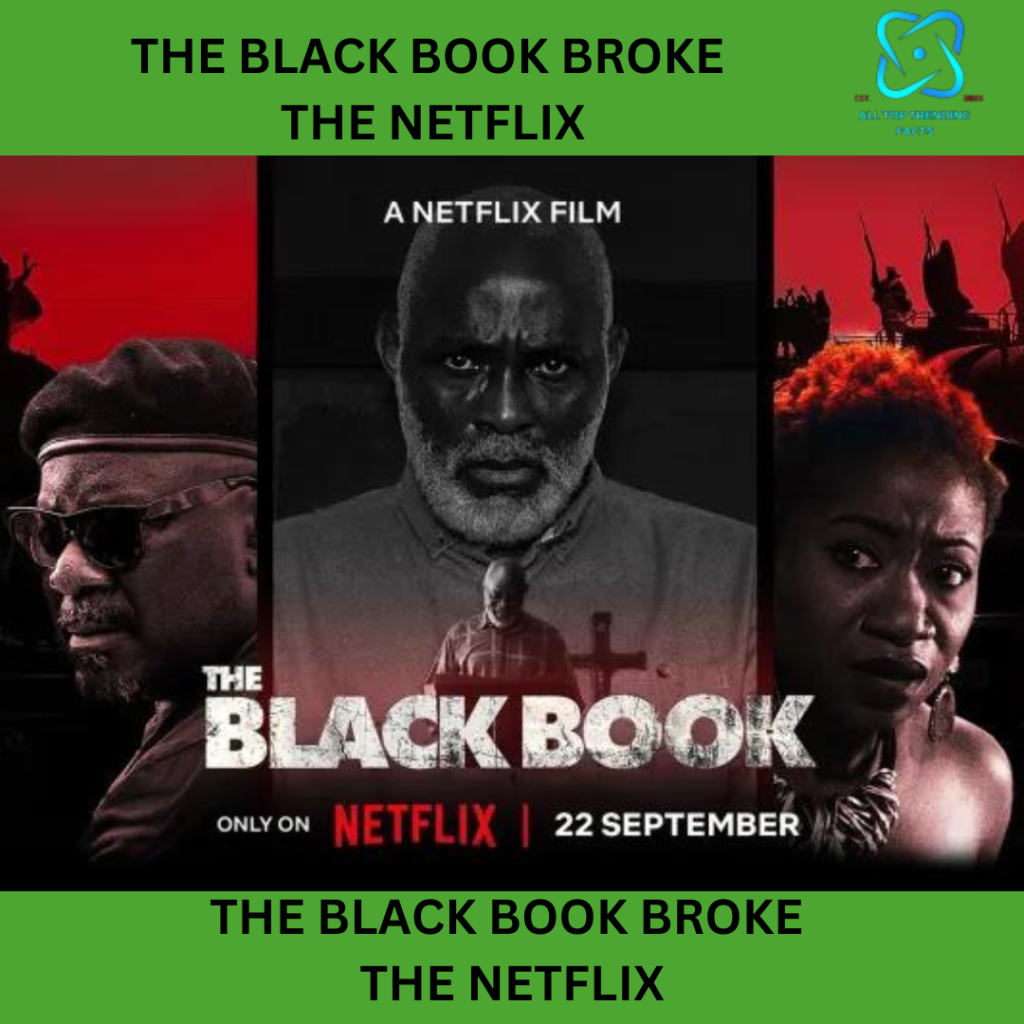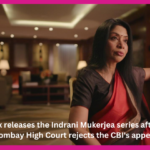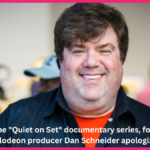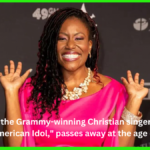Nollywood film “”BLACK BOOK” made history on Netflix in this year.

The Black Book, the retribution thriller from debut filmmaker Editi Effiong, shot to No. 3 on Netflix’s global film charts, making history as the first-ever Nigerian film to do so. The movie, which cost “just” $1 million to make (a significant amount for a Nigerian film), attracted 5.6 million views in the 48 hours following its launch on the platform on September 22. In its first few weeks, over 20 million people watched it, shattering Netflix’s Top 10 list across more than 69 countries.
The movie stars Nigerian cinematic icon Richard Mofe-Damijo as Paul Edima, a deacon whose troubled history resurfaces as a dishonest police gang frames his son (Olumide Oworu) for kidnapping and Edima vows revenge.
The Nigerian Film Smash Hit That Broke The Netflix.
The Black Book is a revenge story that blends action and Nigerian history, covering the country’s past 40 years from military rule to the present, when, in Effiong’s words, “many in the military just changed into civilian clothes and ran for government.” Critics have dubbed the movie Nigeria’s John Wick.
Effiong’s remarkable action sequences are set against a backdrop of police brutality, government corruption, and the frequently fruitless fight for justice by common Nigerians.
Effiong states, “Showing Nigeria as it is, in a way that Nigerian people would recognize, was authenticity key for us.” “Not Lagos as we Nigerians see it, not Lagos as it is portrayed in Hollywood.”
The popularity of the movie has increased the standard for Nigerian films, which have been essential in Netflix’s and other streaming services’ efforts to grow throughout Africa and export African cinema to other countries. According to a survey published in August by the market research firm Digital TV Research, there will be significant development in the African SVOD industry in the upcoming years. The number of SVOD subscriptions is expected to reach 18 million by 2029, which is more than double the current estimate of eight million.
Effiong claims that the Nigerian film industry is currently at a “point right now where the world needs to take notice.”
The director of Black Book discussed making “the biggest film out of Nollywood” and the reasons behind the success of the Nigerian film industry in an interview with The Hollywood Reporter from Lagos.
The Black Book is a revenge story that blends action and Nigerian history, covering the country’s past 40 years from military rule to the present, when, in Effiong’s words, “many in the military just changed into civilian clothes and ran for government.” Critics have dubbed the movie Nigeria’s John Wick.
Effiong’s remarkable action sequences are set against a backdrop of police brutality, government corruption, and the frequently fruitless fight for justice by common Nigerians.
Effiong states, “Showing Nigeria as it is, in a way that Nigerian people would recognize, was authenticity key for us.” “Not Lagos as we Nigerians see it, not Lagos as it is portrayed in Hollywood.”
The popularity of the movie has increased the standard for Nigerian films, which have been essential in Netflix’s and other streaming services’ efforts to grow throughout Africa and export African cinema to other countries. According to a survey published in August by the market research firm Digital TV Research, there will be significant development in the African SVOD industry in the upcoming years. The number of SVOD subscriptions is expected to reach 18 million by 2029, which is more than double the current estimate of eight million.
Effiong claims that the Nigerian film industry is currently at a “point right now where the world needs to take notice.”
The director of Black Book discussed making “the biggest film out of Nollywood” and the reasons behind the success of the Nigerian film industry in an interview with The Hollywood Reporter from Lagos.
No, I wasn’t. Allow me to clarify. I recall the first crew meeting and the first day on set of my first picture as a director. I was losing my mind. All I can think as I go around is, this is real. Upon surveying the room, I realized that I was arguably the least seasoned individual present. I then remarked, “Look, guys, this film is going to test and push everyone; the scale of the script is probably unlike anything you’ve ever done.” We will make the best movie any of us has ever made, though, if you just put your trust in me and let’s do what we’re planned.
My script supervisor pulls me aside about two weeks into the shoot and says, “Editi, I thought you were a bit cocky at that first meeting.” But now, I believe I understand.
This will be the largest Nollywood film, I informed my financial partners at our meeting. I informed CNN that this was the biggest Nollywood film to date when they arrived on site to conduct a special on the movie. I posted that on my Instagram, so you can check it out again. After the movie released and became the largest Nollywood film ever, I told my CNN buddies, “I told you so.” I completed it.
But I will tell you the truth. Upon reloading the page, the daily tracker indicated that it had become a worldwide hit on Netflix. Everyone simply went insane, I guess.

What do you believe to be the key to the movie’s extraordinary box office success?
We carried out all of our work to the greatest standards possible, both in terms of production and, more crucially, pre-production. We put a lot of effort into the screenplays; we wrote and prepared them over the course of two years. Nollywood movies are typically shot in two to three weeks. We spent four months filming this.
I took great care and a lot of time to ensure that the images on the screen were of the highest caliber. My goal was to be exceptional by all measures, not only by Nigerian ones. from the lenses to the lighting to the camera. We used Panavision cameras and technology for the first time in a Nigerian film production. Although it was costly, we raised the necessary funds to make sure we could fulfill those requirements.
In order to prepare the actors for the parts, we also invested a lot of time in rehearsal—something that is also uncommon in many Nollywood productions. The performances in this movie reflect the 13 months of research and development.

The Black Book has been likened by many to Hollywood action films such as John Wick; yet, I believe it to be specifically Nigerian.
For us, authenticity was crucial. It was crucial for us to view Legos from the perspectives of all societal classes in the city, including the wealthy, middle class, and destitute. to portray the world in a way that allows Nigerians to recognize themselves in it. We approach topics like police violence in the movie from a Nigerian viewpoint.
I watched Captain America: Civil War, a Marvel movie, and there was a sequence that was purportedly shot in Lagos, Nigeria, according to the screen. A market and a brawl are present. As I watched, I couldn’t help but think, Hollywood, hurry up! I could have performed more effectively! Because Nigerian markets don’t look like that. Looking at our scene in the market in The Black Book, you can see how a Lagos market seems. Even though we only spent a minute on screens, the planning process took three months. To convince the street gangs to cooperate with us and allow us to film there, we went to them. We brought approximately 300 extras, all of whom are from Lagos. The real market women were compensated, and we gave them acting lessons to help them ignore the camera. Since this was conducted in the midst of COVID, we tested everyone to ensure that our 59-year-old lead actor wouldn’t get infected.
However, a Nigerian market looks much like that, as you can see! Everyone is moving, it’s raucous, nobody is staring at you, and you keep getting shoved. Nigerians identified with that type of authenticity because it came from here, rather than from the outside telling the tale of Africans or from Hollywood imagining what the Nigerian market looks like.
You make multiple allusions to actual occurrences and political shifts in Nigeria. What significance did this political context have for the narrative you intended to convey?
When the military ruled Nigeria forty years ago, I believe the country has undergone fundamental change. Many former military personnel are now simply dressing in civilian clothing and running for office. However, certain things have had a huge impact, such as the drug trade. However, young people are not taught about Nigerian history in our schools, and as a result, they are not exposed to it. My goal in making the film is to fully immerse viewers in our history while maintaining the highest level of authenticity.
When the secret police arrived at my school when I was thirteen, they ordered us to dissolve the press club. The military was still in charge back then. I can relate to your anxiety because I experienced it myself, and it makes it possible for you to always be true to yourself and tell stories that are true, much like the ones we used to read in the underground newspapers back when journalists were only permitted to write in secret.
Regrettably, the tale of military dictatorship, political corruption, and brutality authorized by the government is unfortunately too common.
One of the loveliest messages I’ve ever received from a Colombian guy. You might believe that this is Nigeria’s tale, he remarked. However, my nation’s story is precisely this. Additionally, I have received the same message from Argentina, Chile, Brazil, Suriname, India, and Pakistan. That really touched me.
The fact that a movie produced entirely with funds from Nigeria and starring Black people with Black faces became the most popular streaming platform globally, in my opinion, was the greatest affirmation for me. It ranked number one in roughly 20 nations, three in the world, and tenth overall. However, the fact that it was the top-ranked product in South Korea truly made me proud. One of the largest entertainment marketplaces in the world is South Korea, where the populace has excellent taste. The fact that South Koreans selected this black-faced, black-moneyed movie suggests to me that we can all tell our own stories and that the world will accept us for who we are.

Did all of the funding for The Black Book come from Nigeria?
Indeed, in full. I’m not in need of help. I believe that we Africans and Nigerians are finally recognizing that we are capable of providing the funding for our own works of art and films. I’m not going to ask a studio to fund my professional development if I move to Los Angeles. I am the one who pays for my own development. Distribution and market access are what we require. My proposal is so as follows: The tale we are telling has the potential to become very profitable for you. We’re not requesting a favor from you. We’re here to tell you that, at a fraction of the cost, we can tell our stories in a way that will look better than Hollywood and be more true to the original. We are able to pay for them. I’ve demonstrated that I can produce a movie for $1 million that looks like a $100 million Hollywood production. I’ll cover the costs myself. All I have to do is get access to your distribution to become worldwide.

“Hello Everyone” Myself Joydip DN, and I Live in Sylhet And I am a Seasoned Digital Marketer, Accomplished Content Writer, Experienced Blogger And Combines A Wealth of Experience In Online Marketing Trained From Freelancer Lab Academy, With A Strong Linguistic Proficiency, Evident In My Impressive IELTS Band Score. Holding An, MBA With A Major In Management Information System(MIS) From Leading University. I Am(Joydip) Seamlessly Integrates Strategic Business Insights With Technological Acumen To Deliver Organic And Impactful And Results-Driven Content In The Dynamic Digital Landscape. Contact with me: debnathjoydip4@gmail.com”






